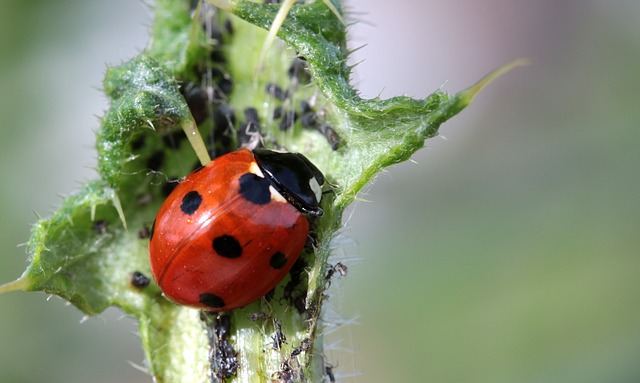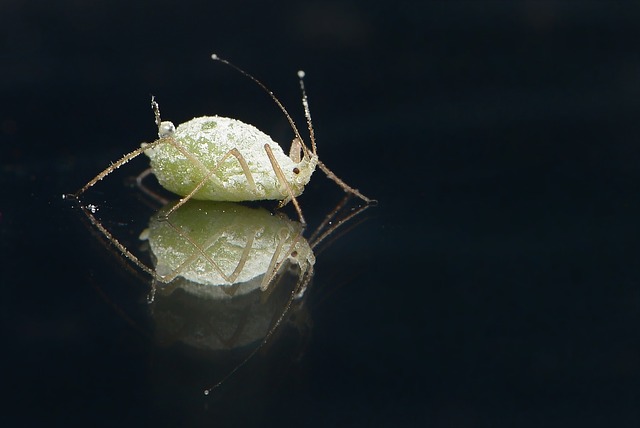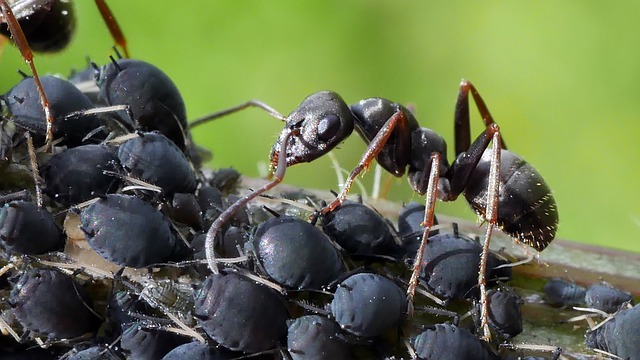Fight aphids
- Quick help to fight aphids
- Resistant plant varieties that are not affected by aphids
- Fight aphids by spoiling appetite
- Fight aphids – with beneficial insects
- Tools in the fight against aphids
- Control aphids with a hair dryer
- You can also control aphids with a water bath
- Aphids can become a problem over a long period of time
- Strengthen your plants
- Quarantine aphids
- Is it worthwhile to dispose of plant parts in the compost?
- Can you prevent aphid infestation?
- Determine the extent of the aphid infestation – How to fight aphids
- Slight infestation of aphids
- Moderate aphid infestation
- Heavy aphid infestation
- Worth knowing and direct tips for fight aphids with spraying agents and the like
Before you fight aphids, you should make sure of the infestation. If you look closely, you can see the insects, which are only a few millimeters in size, with the naked and untrained eye.
Aphids mostly feast on the young, new, fresh shoots, buds, flowers and leaves. They can usually be found at so-called nodes on the plant. Therefore, pay special attention to the pests in these areas.
Aphids cause poor growth of the plant. Falling leaves, buds and flowers also indicate an infestation. Affected areas can also cripple.
Quick help to fight aphids
There are various pesticides to combat aphids. It is particularly useful when starting an outbreak to prevent crippling. It should also be borne in mind that the population will slowly decline naturally in the middle to the end of July, since the beneficial organisms are particularly busy and abundant in these months.

The aphids suck out the plant juice containing sugar from the plants and then excrete honeydew. You can easily recognize the honeydew by a sticky coating over the plants. You need to fight aphids as soon as possible when they find that the entire plant is affected by honeydew. The honeydew attracts other insects and can prevent the plant from photosynthesis if it is heavily infested.
If you recognize aphid infestation, it is important to act. You can use insecticide oils or beneficial insects.
However, if the tips of the shoots are already badly damaged, it makes sense to cut off the damaged branches and shoots and dispose of them.
If the aphid infestation recurs or is very advanced, you can use pesticides.
Please only use beneficial products. These insect repellants block the aphid airways. The so-called trachea is blocked and the pests suffocate. Important: Spray the plants thoroughly from all sides and repeat this process.
Resistant plant varieties that are not affected by aphids
You can save yourself the hassle of aphids by planting aphid-resistant or tolerant plants.
For example, aphids infest red salads less often than green salads. Aphids are more likely to be attracted to lighter leaves. However, it can happen that the plants lose their resistance when the aphids lose their aversion to the plant.
Fortunately, there are many different ways to fight aphids. Try different home remedies or biological remedies to deal with the plague. Search your kitchen cupboard.

However, if the aphids get out of hand, they should use an insecticide so that they cannot spread throughout their garden. Make sure that chemical and biological spray agents can also be harmful to human health. For example, they settle in the roots and leaves. Consuming the plant too early can pose health risks.
Therefore, in our rubric against lice, inquire exactly which sprays you can use for crops such as fruit, vegetables and herbs and follow the instructions on the preparations.
Fight aphids by spoiling appetite
- Make the garden close to nature around predators of the aphids
- Target beneficial organisms
- Plant unpopular plant species for the aphids
- Prevention by checking early for an infestation
- Remove the first lice by hand or water jet
If only a few plants and then individual shoots are affected by aphids, it is enough to remove the pests from the leaves with a strong jet of water. Aphids without wings are immobile and have problems moving even at short distances. For example, 20 to 30 centimeters are insurmountable hurdles for insects. Therefore, the chance that the aphids re-infest the plant is very small because they cannot cover these distances.
Fight aphids – with beneficial insects
Aphids already have some natural enemies anyway. You can consciously locate these beneficials in the garden and create a beautiful living space. For example, you can buy an insect hotel or build one yourself to provide shelter for the beneficial animals. Fighting aphids is the passion of some beneficial organisms. Wasps, ladybugs and ear creeper are the most important and effective beneficials in the fight against aphids.
Fighting aphids is a daily business for the beneficial organisms. Ladybugs, for example, feed almost exclusively on the pests. Build shelters for the beneficials by leaving dead wood lying around or by placing them upside down. For example, turn a flower pot the wrong way round and fill it with wood wool. Make sure that the aphids are not too far away from the beneficial organisms, as they also cannot travel long distances. The beneficial organisms are best able to control the aphids if they can be reached directly.
Tools in the fight against aphids
Don’t take up chemistry straight away.
Especially when aphids infect fruit trees or vegetables, they should not immediately use chemical insecticides, but try to get rid of the aphids in a different way. Aphids in herbs, vegetables and lettuce can also cause significant damage and should be controlled. However, if you process the aphids directly with the chemical club, vegetables and fruit cannot be eaten for a certain period of time. In addition, the chemical substances are usually just as toxic to humans and can disrupt the immune and hormonal systems. Insecticides can also affect male fertility. Asthma and rashes are also associated with chemical insecticides.

Healthier and cheaper you can put aphids on the skin with home remedies. These natural remedies can be used with a small aphid infestation without any problems. However, multiple use is required. However, these means are comparatively harmless for beneficial organisms and humans. They are effective and biodegrade quickly. Treating with a simple water jet is also effective against aphids. Spray the aphids directly from the plants. Afterwards, they have the greatest problems getting back to the plants from the ground, as they cannot move well and only progress very slowly.
Control aphids with a hair dryer
Yes exactly – you can fight aphids with a hair dryer. You don’t have to resort to chemical or biological insecticides directly. You can try to brush the aphids off the leaves with your fingers or you can use a hair dryer directly – with houseplants, of course. Hold the hair dryer and the plant at an angle over the bathtub and blow the lice with the hair dryer. These are blown off by the hair dryer after a short time or jump off by themselves. Then just rinse the bathtub and the lice are no longer your problem.

Aphids don’t like the wind. For vegetables and fruit, windier places are better than wind-protected places. The aphid does not like it when it is constantly on the train. This makes aphids and vegetable flies harder to get from branch to branch. In addition, plants dry faster in the wind and are therefore less susceptible to insects and fungi.
You can also control aphids with a water bath
Smaller plants can drown the pests. You can simply immerse the plant in warm water for about two hours. Before doing this, wrap the pot and the parts with soil in a plastic bag. This ensures that the soil is not washed out of the plant.
Nowadays, experts advise against spraying the pests with a solution of washing-up liquid and water, since these soap-containing solutions are neither good for the plants nor for the environment. Leaves can get sticky spots or even burn. The soap-containing solution is also bad for flowers and buds.
This treatment would also have to be repeated more often, since not all pests immediately disappear or die off.
If the pests cannot be controlled in a natural way, they can still use a plant protection product. Various preparations are available commercially. On our site you can order the most effective preparations directly from Amazon.
The best thing is to let nature do its job and use beneficial organisms.
Aphids can become a problem over a long period of time
If the aphids suckle on a plant for an extended period of time and in increasing numbers, this can lead to major problems. They weaken leaves, buds and shoots. This means that whole parts of plants can die or the fruit can cripple. Because more lice excrete more and more of the sugar-containing honey dew, they also offer more and more breeding ground for fungi and attract more pests.
The longer honeydew, aphids and fungi have been on the plant, the more harmful it is because they are disturbed in photosynthesis. It also increases the risk that aphids will transmit viral diseases and other diseases to the plant on which they suckle.
If aphid has a virus in it and changes to a healthy plant, it infects it.
Strengthen your plants
Always plant your plants the way they can best withstand the weather conditions or in places you like. There are plants that prefer to grow in the sun and that prefer shade. When choosing a plant, make sure you have the right lighting conditions. The plant will thank you and is strengthened and is therefore not easily attacked by aphids. You should also make sure that the plants are not too wet or too dry. Find out about the right soil moisture and nutrient supply. Too much fertilizer can also be harmful if the plants are then very nutritious and lice prefer them. In addition, the fertilizer makes the plants‘ tissues softer, making them more susceptible.
In addition to the right location, moisture and fertilization, you can also specifically strengthen the plant. With a plant tonic. If you spray this product regularly, you stimulate the plants to form a firmer tissue and create repellants. As a result, pests have no drive to suck in firmer tissue.
You can use these plant tonics:
- organic NPK fertilizer produced using vegetable substances
- natural herbal extract
- nourishes the plants, strengthens the tissue with naturally contained silicate (silica)
- as a watering and spraying agent leads to vigorous and healthy growth in all plants
- Vital plants are more resistant and therefore less susceptible to diseases and stress. For healthy and sick plants.
- supports plant health and plant vitality
- strengthens weakened plants
- promotes root growth and thus nutrient absorption
- increases flowering and blooming
Quarantine aphids
It is often forgotten that the aphid colony can also spread further from green waste or compost. Make it more difficult for the aphid to spread and remove the lice from the native plants as far as possible. It is difficult for the lice to move over medium to long distances, but one should be careful not to make it too easy for them to attack new plants. Therefore make it more difficult for the pests to find new host plants.
Is it worthwhile to dispose of plant parts in the compost?
You can only answer this question with „No“. Aphids need living tissue to reproduce and eat. The pest will immediately look for a new source of food and other plants in their garden will please. Instead, take the cut shoots to the household waste and pack them in a plastic bag before the aphids on other plants in your garden make themselves comfortable.
Can you prevent aphid infestation?
No 100% cannot prevent aphid infestation. However, there are some precautionary measures that can be taken for prevention. The most important thing is to increase the resistance of the plant and to strengthen it. Plants that are more resistant than others are spared from the pests, as these cannot penetrate the strong tissue or would be more exhausting than with other plants.
Note the requirements of the crops, such as location or moisture.
If the location is chosen incorrectly, the plant is weaker and more susceptible to pests and fungi.
You can do this to counter the insects:
- Fertilize with coffee grounds
- Use nettle broth for watering
- Control is everything
- Bury garlic plants or toes in the ground
- Avoid extreme wetness
- Avoid extreme dryness
Determine the extent of the aphid infestation – How to fight aphids
Depending on the extent of the aphid infestation, you can control it by various means. Try a home remedy or a biological remedy first before reaching for the chemical club. You can use this method to control aphids as well as with chemical agents.
- Slight infestation of aphids
- Medium infestation of aphids
- Severe aphid infestation
Slight infestation of aphids
If the amount of aphid infestation is still manageable and little to no damage to the plants has occurred, you can easily control the aphids with home remedies. You don’t have to use chemical agents. Fighting aphids is also biological. These biological or home remedies also show their effects. Controlling aphids is as easy as using chemical agents, but you have to use them regularly. Give it a try and wait before using chemical agents.
Moderate aphid infestation
For example, you can control the aphids with nettle stock. This aphid remedy is easy to make and is organic. How to fight aphids with a nettle? Yes exactly. Pour the broth of the nettle into a spray bottle and spray on the affected areas. Use this product until there are no more aphids on your plants. You can also use the nettle slurry for fertilizing. This is ideal because it makes fighting aphids totally easy. The plants absorb part of the broth or liquid manure and the aphids refuse to suckle. You can’t get off nettles.
You could also use soapy water. This is the classic in the fight against aphids, but experts are increasingly advising against it, since the soapy water can also damage the plants and can impair them during photosynthesis.
Use about 50 grams of core soap and 80 milliliters of spirit. Simply mix in a spray bottle and spray on the aphids. Cover the potting soil during the procedure and do not expose the plant to the sun afterwards, otherwise the leaves may burn.
Control aphids with tobacco stock. Tobacco brew should also help to remove the insects. Simply boil the ashes or the stubbed-out cigarette butts in water until the brew turns brown. Then also provide this with core soap and spray on undiluted. As with soapy water, please cover the potting soil beforehand and do not expose the plant to direct sunlight.
Heavy aphid infestation
If the aphid infestation is very severe, control the aphids. This usually only works with chemical agents. However, there are also many different ones here. Make sure that these chemical agents do not harm beneficial organisms.
You can also cut whole plant parts to prevent the spread and infestation of the aphids.
Worth knowing and direct tips for fight aphids with spraying agents and the like
- When spraying, make sure that the plants are not exposed to direct sunlight.
- Spray especially on the undersides of the leaves, as most of the insects are sitting there.
- Make sure that you don’t forget any places.
- Spraying with the water jet often helps with a mild infestation
- Soft soap, hair dryer, nettle can also be a tried and tested remedy.
- Cover the soil before using soap.
- Use the home remedies regularly.
- If there is more infestation, they should use insecticides. Make sure that they are not harmful to beneficial organisms and bees. These beneficials should protect them as they support them in the fight against vermin.
- Healthy plants are much more resistant, so make sure that they are planted and moist.
- Strengthen plants if necessary.
- Don’t fertilize too much.
- Place beneficial organisms and do not spray them.